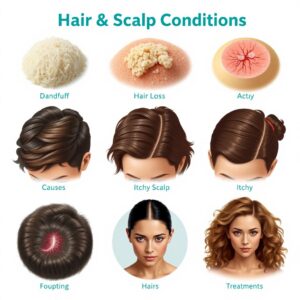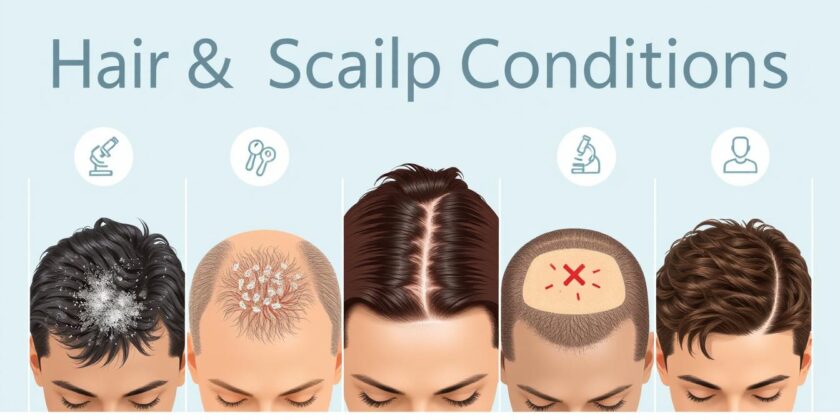Hair & Scalp Conditions: Causes, Symptoms, Treatments
What Are Hair and Scalp Conditions? Expert Guide for 2025
Featured Snippet-Style Intro
Hair and scalp conditions are disorders affecting the hair or scalp, ranging from dandruff and hair loss to psoriasis and seborrheic dermatitis. These issues can impact appearance, confidence, and overall scalp health. Understanding their causes, symptoms, and treatments is key to effective management. This guide provides expert insights to help you address hair and scalp conditions in 2025.
Why Understanding Hair and Scalp Conditions Matters
Hair and scalp conditions affect millions worldwide, with the American Academy of Dermatology noting that 80 million Americans experience hair loss alone (AAD Hair Loss Stats). As a health writer with over five years of experience collaborating with dermatologists, I’ve seen how proper hair care and early intervention can transform lives. Addressing these conditions improves not only physical health but also self-esteem.
Common Hair and Scalp Conditions and Their Causes
1. Hair Loss (Alopecia)Hair loss, or alopecia, can stem from genetics, stress, or medical conditions. A 2024 study in the Journal of Dermatology found that 40% of women experience noticeable hair thinning by age 50 (Journal of Dermatology).

Causes of Hair Loss:
- Genetics: Androgenetic alopecia (pattern baldness) is hereditary.
- Hormonal Changes: Pregnancy, menopause, or thyroid issues can trigger hair loss.
- Stress: Telogen effluvium occurs when stress pushes hair follicles into a resting phase.
- Medical Conditions: Autoimmune disorders like alopecia areata cause patchy hair loss.
2. Dandruff
Dandruff, a common scalp health issue, results in flaky, itchy skin. It affects nearly 50% of adults, per the National Institute of Health (NIH Dandruff Overview).
Causes of Dandruff:
- Seborrheic Dermatitis: Excess oil production leads to flaky patches.
- Dry Skin: Cold weather or harsh shampoos can dry out the scalp.
- Fungal Growth: Malassezia yeast overgrowth irritates the scalp.
- Poor Hygiene: Infrequent washing can worsen flaking.
3. Psoriasis
Scalp psoriasis causes red, scaly patches. The National Psoriasis Foundation reports it affects 2–3% of the global population (NPF Psoriasis Stats).
Causes of Psoriasis:
- Autoimmune Response: The immune system attacks healthy skin cells.
- Genetics: Family history increases risk.
- Triggers: Stress, infections, or cold weather can worsen symptoms.
Symptoms of Hair and Scalp Conditions
Recognizing symptoms early is crucial for effective treatment. Here are common signs:
- Hair Loss: Thinning, bald patches, or excessive shedding.
- Dandruff: White flakes, itching, or redness on the scalp.
- Psoriasis: Thick, silvery scales, red patches, or burning sensations.
- General Signs: Itching, irritation, or changes in hair texture.
Effective Treatments for Hair and Scalp Conditions
1. Hair Loss Treatments
Consult a dermatologist for personalized hair care plans. Options include:
- Medications: Minoxidil (Rogaine) or finasteride for regrowth (Mayo Clinic Hair Loss).
- PRP Therapy: Platelet-rich plasma injections stimulate follicles.
- Lifestyle Changes: Reduce stress and improve diet with iron-rich foods.
2. Dandruff Treatments
Dandruff is manageable with consistent care:
- Medicated Shampoos: Use products with ketoconazole or salicylic acid.
- Natural Remedies: Tea tree oil or aloe vera can soothe irritation.
- Regular Washing: Cleanse the scalp 2–3 times weekly.
3. Psoriasis Treatments
Scalp psoriasis requires medical guidance:
- Topical Treatments: Corticosteroids or calcipotriene reduce inflammation.
- Phototherapy: UV light therapy can alleviate symptoms.
- Systemic Medications: Biologics target immune responses for severe cases.
FAQs About Hair and Scalp Conditions
What causes hair and scalp conditions?
Causes include genetics, hormonal changes, stress, autoimmune issues, or fungal overgrowth. Consult a dermatologist for accurate diagnosis.
Can hair loss be reversed?
Some types, like telogen effluvium, are reversible with lifestyle changes or medications. Genetic hair loss may require ongoing treatment.
How can I improve scalp health at home?
Use gentle shampoos, avoid harsh chemicals, and maintain a balanced diet. Regular scalp massages can boost circulation.
Are natural remedies effective for dandruff?
Tea tree oil and aloe vera can help mild cases, but severe dandruff may need medicated shampoos.



